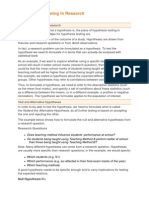0 ratings0% found this document useful (0 votes)
14 viewsMotivating For High Performance
Motivating For High Performance
Uploaded by
Nurun NabiHigh performance is motivated by both intrinsic and extrinsic factors. Intrinsically, people seek challenges, responsibility, and opportunities for personal growth and achievement. Extrinsically, rewards like pay, recognition, and promotion can motivate high performance when they satisfy basic human needs for esteem, belonging, and self-actualization. Managing both intrinsic and extrinsic motivators is important for organizations seeking to encourage high performance.
Copyright:
© All Rights Reserved
Available Formats
Download as PPT, PDF, TXT or read online from Scribd
Motivating For High Performance
Motivating For High Performance
Uploaded by
Nurun Nabi0 ratings0% found this document useful (0 votes)
14 views30 pagesHigh performance is motivated by both intrinsic and extrinsic factors. Intrinsically, people seek challenges, responsibility, and opportunities for personal growth and achievement. Extrinsically, rewards like pay, recognition, and promotion can motivate high performance when they satisfy basic human needs for esteem, belonging, and self-actualization. Managing both intrinsic and extrinsic motivators is important for organizations seeking to encourage high performance.
Original Description:
motivating people for high performence
Original Title
Motivating for High Performance
Copyright
© © All Rights Reserved
Available Formats
PPT, PDF, TXT or read online from Scribd
Share this document
Did you find this document useful?
Is this content inappropriate?
High performance is motivated by both intrinsic and extrinsic factors. Intrinsically, people seek challenges, responsibility, and opportunities for personal growth and achievement. Extrinsically, rewards like pay, recognition, and promotion can motivate high performance when they satisfy basic human needs for esteem, belonging, and self-actualization. Managing both intrinsic and extrinsic motivators is important for organizations seeking to encourage high performance.
Copyright:
© All Rights Reserved
Available Formats
Download as PPT, PDF, TXT or read online from Scribd
Download as ppt, pdf, or txt
0 ratings0% found this document useful (0 votes)
14 views30 pagesMotivating For High Performance
Motivating For High Performance
Uploaded by
Nurun NabiHigh performance is motivated by both intrinsic and extrinsic factors. Intrinsically, people seek challenges, responsibility, and opportunities for personal growth and achievement. Extrinsically, rewards like pay, recognition, and promotion can motivate high performance when they satisfy basic human needs for esteem, belonging, and self-actualization. Managing both intrinsic and extrinsic motivators is important for organizations seeking to encourage high performance.
Copyright:
© All Rights Reserved
Available Formats
Download as PPT, PDF, TXT or read online from Scribd
Download as ppt, pdf, or txt
You are on page 1of 30
MOTIVATION FOR HIGH
PERFORMANCE
Adapted from:
Lussier R. N. (2009) Management
Fundamentals. SWCL.
You might also like
- The Subtle Art of Not Giving a F*ck: A Counterintuitive Approach to Living a Good LifeFrom EverandThe Subtle Art of Not Giving a F*ck: A Counterintuitive Approach to Living a Good LifeRating: 4 out of 5 stars4/5 (5973)
- The Gifts of Imperfection: Let Go of Who You Think You're Supposed to Be and Embrace Who You AreFrom EverandThe Gifts of Imperfection: Let Go of Who You Think You're Supposed to Be and Embrace Who You AreRating: 4 out of 5 stars4/5 (1110)
- Never Split the Difference: Negotiating As If Your Life Depended On ItFrom EverandNever Split the Difference: Negotiating As If Your Life Depended On ItRating: 4.5 out of 5 stars4.5/5 (893)
- Hidden Figures: The American Dream and the Untold Story of the Black Women Mathematicians Who Helped Win the Space RaceFrom EverandHidden Figures: The American Dream and the Untold Story of the Black Women Mathematicians Who Helped Win the Space RaceRating: 4 out of 5 stars4/5 (932)
- Grit: The Power of Passion and PerseveranceFrom EverandGrit: The Power of Passion and PerseveranceRating: 4 out of 5 stars4/5 (619)
- Shoe Dog: A Memoir by the Creator of NikeFrom EverandShoe Dog: A Memoir by the Creator of NikeRating: 4.5 out of 5 stars4.5/5 (545)
- The Hard Thing About Hard Things: Building a Business When There Are No Easy AnswersFrom EverandThe Hard Thing About Hard Things: Building a Business When There Are No Easy AnswersRating: 4.5 out of 5 stars4.5/5 (355)
- Elon Musk: Tesla, SpaceX, and the Quest for a Fantastic FutureFrom EverandElon Musk: Tesla, SpaceX, and the Quest for a Fantastic FutureRating: 4.5 out of 5 stars4.5/5 (476)
- Her Body and Other Parties: StoriesFrom EverandHer Body and Other Parties: StoriesRating: 4 out of 5 stars4/5 (831)
- The Emperor of All Maladies: A Biography of CancerFrom EverandThe Emperor of All Maladies: A Biography of CancerRating: 4.5 out of 5 stars4.5/5 (274)
- The Little Book of Hygge: Danish Secrets to Happy LivingFrom EverandThe Little Book of Hygge: Danish Secrets to Happy LivingRating: 3.5 out of 5 stars3.5/5 (424)
- The World Is Flat 3.0: A Brief History of the Twenty-first CenturyFrom EverandThe World Is Flat 3.0: A Brief History of the Twenty-first CenturyRating: 3.5 out of 5 stars3.5/5 (2272)
- The Yellow House: A Memoir (2019 National Book Award Winner)From EverandThe Yellow House: A Memoir (2019 National Book Award Winner)Rating: 4 out of 5 stars4/5 (99)
- Devil in the Grove: Thurgood Marshall, the Groveland Boys, and the Dawn of a New AmericaFrom EverandDevil in the Grove: Thurgood Marshall, the Groveland Boys, and the Dawn of a New AmericaRating: 4.5 out of 5 stars4.5/5 (270)
- The Sympathizer: A Novel (Pulitzer Prize for Fiction)From EverandThe Sympathizer: A Novel (Pulitzer Prize for Fiction)Rating: 4.5 out of 5 stars4.5/5 (124)
- Team of Rivals: The Political Genius of Abraham LincolnFrom EverandTeam of Rivals: The Political Genius of Abraham LincolnRating: 4.5 out of 5 stars4.5/5 (235)
- A Heartbreaking Work Of Staggering Genius: A Memoir Based on a True StoryFrom EverandA Heartbreaking Work Of Staggering Genius: A Memoir Based on a True StoryRating: 3.5 out of 5 stars3.5/5 (232)
- On Fire: The (Burning) Case for a Green New DealFrom EverandOn Fire: The (Burning) Case for a Green New DealRating: 4 out of 5 stars4/5 (75)
- The Unwinding: An Inner History of the New AmericaFrom EverandThe Unwinding: An Inner History of the New AmericaRating: 4 out of 5 stars4/5 (45)
- Foysal Hossain CV.Document2 pagesFoysal Hossain CV.Nurun NabiNo ratings yet
- Critical Literature Review Saunders AmendedDocument28 pagesCritical Literature Review Saunders AmendedNurun Nabi100% (2)
- Assignment-Int Marketing LitonDocument12 pagesAssignment-Int Marketing LitonNurun NabiNo ratings yet
- Developing A Business Plan. Case Simon's Smoothies: Simonson, ConnorDocument56 pagesDeveloping A Business Plan. Case Simon's Smoothies: Simonson, ConnorNurun NabiNo ratings yet
- Use of SPSS For Two-Way TestsDocument4 pagesUse of SPSS For Two-Way TestsNurun NabiNo ratings yet
- Assignment 1Document17 pagesAssignment 1Nurun NabiNo ratings yet
- Research Proposal of BhavanaDocument12 pagesResearch Proposal of BhavanaNurun NabiNo ratings yet
- Statement of PurposeDocument2 pagesStatement of PurposeNurun NabiNo ratings yet
- Hypothesis Testing in ResearchDocument4 pagesHypothesis Testing in ResearchNurun NabiNo ratings yet
- A Report On Urban TourismDocument16 pagesA Report On Urban TourismNurun Nabi100% (3)
- Questions For Questionnaire SurveyDocument2 pagesQuestions For Questionnaire SurveyNurun NabiNo ratings yet
- Assignment-Strategic MGT AccountingDocument12 pagesAssignment-Strategic MGT AccountingNurun NabiNo ratings yet
- Introduction To EthicsDocument11 pagesIntroduction To EthicsNurun NabiNo ratings yet





















































